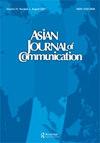Pseudo-participation, authentic nationalism: understanding Chinese fanquan girls’ personifications of the nation-state
IF 1.5
2区 文学
Q2 COMMUNICATION
引用次数: 0
Abstract
ABSTRACT What are the dynamics of the participatory online discourse in an authoritarian context? More specifically, what patterns of Chinese state-society interactions can be drawn from the existing nexus of top-down control and bottom-up participation? To explore the questions, this study examines the Chinese nation-state personifications produced by ‘fanquan girls’, nationalistic fans of pop stars, during the 2019 Hong Kong protests. Three types of imageries and scenarios emerged, i.e., the nation as a charismatic idol in a discursive struggle, a protective brother on a battlefield, and a victimized mother in a trial. These visualizations construct a discursive kinship that justifies China’s governance over Hong Kong and refutes the intervention from foreign ‘hostile forces’ through visualized national strength, state-society unity, and colonial sufferings. During the process, the state provided the ideological mindset and delimited the political boundaries, the fandom participants turned the state-promoted ideas and sentiments into youth-appealing memes, and both sides appropriated and circulated each other’s creations in joint self-defense against outside reproval and opposition. Therefore, the paper argues that this communicative pattern consolidates the state’s discursive co-optation of the society rather than demolishes the authoritarian rule.伪参与、真民族主义:解读中国樊圈女孩的民族国家人格化
摘要:在威权主义语境下,参与式网络话语的动力是什么?更具体地说,从现有的自上而下的控制和自下而上的参与关系中,可以得出中国国家与社会互动的哪些模式?为了探究这些问题,本研究考察了2019年香港抗议活动中流行歌星的民族主义粉丝“粉丝女孩”所产生的中国民族国家化身。出现了三种类型的图像和场景,即国家在话语斗争中成为魅力偶像,在战场上成为保护兄弟,在审判中成为受害母亲。这些可视化构建了一种话语式的亲缘关系,证明了中国对香港的统治是合理的,并通过可视化的国力、国家社会团结和殖民地苦难驳斥了外国“敌对势力”的干预。在这个过程中,国家提供了意识形态心态,划定了政治边界,粉丝群体参与者将国家宣传的思想和情感变成了吸引年轻人的模因,双方挪用和传播彼此的创作,共同防御外界的指责和反对。因此,本文认为,这种交际模式巩固了国家对社会的话语选择,而不是摧毁专制统治。
本文章由计算机程序翻译,如有差异,请以英文原文为准。
求助全文
约1分钟内获得全文
求助全文
来源期刊

Asian Journal of Communication
COMMUNICATION-
CiteScore
3.70
自引率
0.00%
发文量
38
期刊介绍:
Launched in 1990, Asian Journal of Communication (AJC) is a refereed international publication that provides a venue for high-quality communication scholarship with an Asian focus and perspectives from the region. We aim to highlight research on the systems and processes of communication in the Asia-Pacific region and among Asian communities around the world to a wide international audience. It publishes articles that report empirical studies, develop communication theory, and enhance research methodology. AJC is accepted by and listed in the Social Science Citation Index (SSCI) published by Clarivate Analytics. The journal is housed editorially at the Wee Kim Wee School of Communication and Information at Nanyang Technological University in Singapore, jointly with the Asian Media Information and Communication Centre (AMIC).
 求助内容:
求助内容: 应助结果提醒方式:
应助结果提醒方式:


